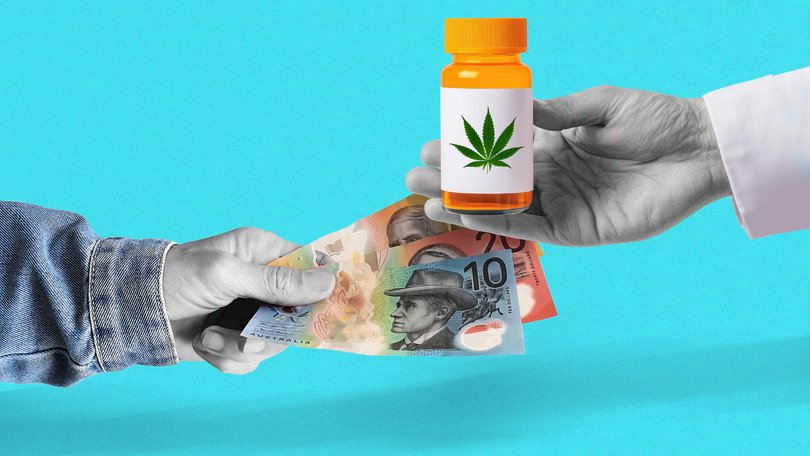Cannabis is becoming legal in Australia by stealth: Online providers prescribing marijuana and cannabis oil
AARON PATRICK: An explosion in doctor-prescribed marijuana and cannabis oil, often on flimsy health grounds, worries health officials. One doctor reportedly issued 72,000 prescriptions in two years.

There were no mass street protests. No impassioned speeches on the steps of Parliament. Few petitions and little visible support from celebrities or civic leaders.
But over the past four years there has been a historic shift in Australia’s approach to its most popular illicit drug. Cannabis use is effectively being legalised by the growth of professional suppliers.
Leaked figures published Monday demonstrated how demand for medical cannabis is exploding. A single doctor at Montu, Australia’s largest cannabis provider, wrote 72,000 prescriptions for the drug in two years, according to the Nine newspapers, a figure not challenged by the business.
Sign up to The Nightly's newsletters.
Get the first look at the digital newspaper, curated daily stories and breaking headlines delivered to your inbox.
By continuing you agree to our Terms and Privacy Policy.Assuming the doctor averaged five days a week work for 46 weeks a year, that meant he or she issued 156 scripts each day. While the individual circumstances are unclear, Montu and its competitors are making cannabis relatively cheap and easy to obtain.
Amazon-like service
The company advertises 10-minute, $29 video calls with its doctors. Chronic pain and anxiety are two of the most common reasons for a prescription. Patients don’t necessarily have to provide any further evidence they’re ill.
Montu’s wholesale cannabis supply business, Leafio, allows patients to order their drugs in a few minutes using a website almost as slick as Amazon’s. Revenue last year was $263 million, according to The Age. On Google, the company has 1,192 reviews, averaging four stars. It has hired former health minister Greg Hunt to negotiate industry guidelines for prescribing cannabis over the phone and video calls.
A company spokesman said on Monday that some of its prescriptions are never used because they are for a different doses or cannabis products the patient decides they do not need. Others are repeat prescriptions for the same product.
“There is no requirement that the doctor appointment only takes 10 minutes,” the spokesperson said. “The length of a consult is governed only by the time the doctor needs to perform a medical assessment which is dependent on the complexity of the medical history of the patient.”
Commercial drug market
The Government does not track the exact number of people who buy legal cannabis. But since legal medical use began in 2016, doctors have approved the drug 2.1 million times. Use accelerated in 2021 when a single, permanent licence was introduced for medical cannabis producers.
Demand quickly took off, helped by what Health Minister Mark Butler refers to as “unscrupulous” medical cannabis companies. Some customers have reported being sent less cannabis than they paid for. Others were switched to brands, without their permission, more profitable for the supplier.
Doctors are concerned the system is being turned into a commercial drug market with little care for patients’ health. “The main problem is how do you differentiate a patient who is going to use it therapeutically from someone who is obtaining it to use themselves or give to someone else recreationally,” former deputy chief medical officer Nick Coatsworth said.
Three weeks ago a medical regulator, the Australian Health Practitioner Regulation Agency, warned cannabis doctors to be more careful and said there was evidence some cannabis clinics were “over-servicing” and operating in “ethical grey areas”.
“We don’t prescribe opioids to every patient who asks for them, and medicinal cannabis is no different,” Medical Board of Australia chair Susan O’Dwyer said at the time. “Patient demand is no indicator of clinical need.”
Lower IQs
Cannabis is legal in almost half of the US and Canada. In Australia, it is decriminalised in South Australia and the Northern Territory, which means there is no criminal penalty for recreational use. Small quantities are legal in the ACT.
It has long been Australia’s most popular recreational drug. In 2022, 3 per cent of Australian adults and teenagers reported using it for medical reasons. In total, 12 per cent of people reported consuming cannabis in the previous year. Another updated survey on use is underway.
While the health system facilitates use of the drug, other arms of the Government argue against it. The Federal and State Governments fund the Drug and Alcohol Foundation, which argues that cannabis consumption leads to lower IQs, “diminished life satisfaction and achievement” and a higher risk of psychotic disorders.

